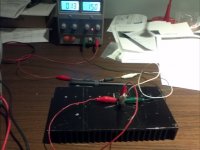Purchased 20 irfp140 and 20 irfp9140 mosfets.
Matching them has been less than fun.
Setup:
Mastech 30v 10A power supply
Large-ish blank anodized heat sink 4x6x1 inch
Sheathed alligator clip leads
Silicon iso pad.
15v, 60 ohm power resistor .13A
I thought I was getting good readings but if the dmm lead are touched or if I reach over the setup, the voltage swings but never settles to it was originally.
If i re-test, the Vgs is different.
If i touch the heat sink the voltage changes.
I don't trust the readings so I can't continue with the build. I don't remember it being this difficult.
I tried 4 meters and different meter leads.
How is matching done properly?
Matching them has been less than fun.
Setup:
Mastech 30v 10A power supply
Large-ish blank anodized heat sink 4x6x1 inch
Sheathed alligator clip leads
Silicon iso pad.
15v, 60 ohm power resistor .13A
I thought I was getting good readings but if the dmm lead are touched or if I reach over the setup, the voltage swings but never settles to it was originally.
If i re-test, the Vgs is different.
If i touch the heat sink the voltage changes.
I don't trust the readings so I can't continue with the build. I don't remember it being this difficult.
I tried 4 meters and different meter leads.
How is matching done properly?
Last edited:
First, don't put a lot of trust in the meters which come with the regulated supplies.
Second, you may be seeing some parasitics - use a 470 to 1Kohm Gate resistor.
If this doesn't work, try an analog meter.
😎
Second, you may be seeing some parasitics - use a 470 to 1Kohm Gate resistor.
If this doesn't work, try an analog meter.
😎
From http://www.firstwatt.com/pdf/art_mos_test.pdf :
"P4 doesn’t matter here , as the DC is blocked by the
capacitor, but it is always nice to have a few ohms in series
with the Gate of any Mosfet to prevent high frequency
(parasitic) self-oscillation, which will alter the voltage
reading."
😉

"P4 doesn’t matter here , as the DC is blocked by the
capacitor, but it is always nice to have a few ohms in series
with the Gate of any Mosfet to prevent high frequency
(parasitic) self-oscillation, which will alter the voltage
reading."
😉

Thanks everyone.
So the output reading on the regulated supply is not to be trusted. Check.
Use a gate stopper. Check.
Will recheck tomorrow. Check. 🙂
So the output reading on the regulated supply is not to be trusted. Check.
Use a gate stopper. Check.
Will recheck tomorrow. Check. 🙂
You must keep Tj at the same value for every test/DUT, that is really difficult !
Yes, I imagine it's difficult keeping accurate temps. I left the setup out over night with the mosfets on the same table, Closed a vent that pushed air over that work area. That's the best I could do. I wasn't going to measure Tj. 🙂
the readings were completely different for the N-Ch fets. Some read 7.xxV other times 5.xx, but with the gate resistor, every fet was in the 5.1xxV range.
Interestingly, the P-ch fets had closer readings with or without the gate resistor, even a day later and with different room temps.
Thanks.
Vince
Last edited:
- Status
- Not open for further replies.
- Home
- Amplifiers
- Pass Labs
- mosfet matching wide variations/swings

